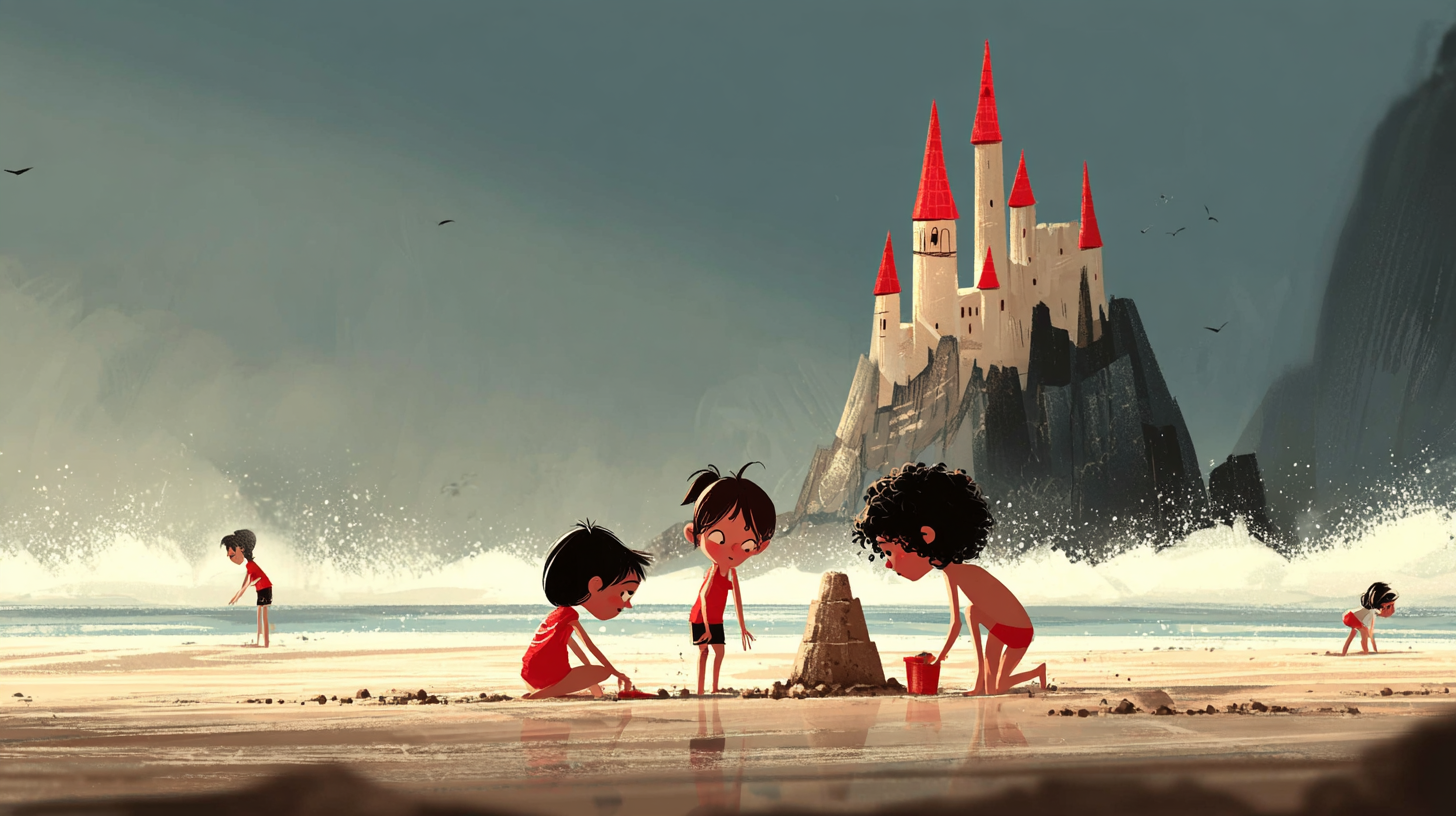“Sand” means small stones on the beach or desert, or to make wood smooth by rubbing it.
「sand」は、海や砂漠にある細かい石のつぶ(砂)や、木を滑らかにするときに使う「やすりをかける」という意味です。
以下は英単語 “sand” に関するストーリー型学習コンテンツです。まずは大枠の意味を理解して最後の文章で確認しましょう。
主な意味(main meaning)
| 品詞 | 発音記号 | 意味 | 英語例文 |
|---|---|---|---|
| 名詞 | /sænd/ | 細かい石の粒でできた地面の材料(砂) | The children played in the sand at the beach. |
| 動詞 | /sænd/ | 表面を紙や道具でこすって滑らかにする(やすりをかける) | He sanded the wooden table to make it smooth. |
語源(etymology)
「sand」は古英語 sand に由来し、もともと「細かい石の粒」という意味。イメージは「こまかくくだかれた自然のかけら」。
類義語(synonyms)
| 類義語 | 意味 | 英語例文 |
|---|---|---|
| gravel | 小石 | The path was covered with gravel. |
| dust | ほこり、ちり | There was a lot of dust on the bookshelf. |
| soil | 土 | The farmer tested the soil before planting crops. |
| grit | 細かい砂粒 | The wind blew grit into my eyes. |
反義語(antonyms)
| 反義語 | 意味 | 英語例文 |
|---|---|---|
| rock | 岩 | He sat on a big rock near the river. |
| clay | 粘土 | The artist shaped the clay into a pot. |
コロケーション(collocations)
| コロケーション | 英語例文 |
|---|---|
| sand castle | The kids built a big sand castle at the beach. |
| desert sand | The desert sand was hot under my feet. |
| white sand | We enjoyed walking on the white sand beach. |
| sand dune | The camel walked over the sand dunes. |
| wet sand | My shoes got stuck in the wet sand. |
2項表現(binomials)
| 2項表現 | 英語例文 |
|---|---|
| sand and water | The children mixed sand and water to make a castle. |
| rocks and sand | The truck carried rocks and sand for construction. |
英語ストーリー(english story)
Last summer, Emma and her family went to a beach resort. When they arrived, Emma immediately noticed the white sand shining under the sun. It was so soft that she wanted to walk barefoot. Her younger brother, Tom, was excited to build a sand castle near the waves. Together, they carried buckets of wet sand and shaped towers, walls, and even a gate.
While they were playing, their father pointed to the sand dunes in the distance. He explained that the wind moved the sand over time, creating hills in the desert or by the sea. Tom was curious and asked, “Is sand the same as soil?” His father smiled and answered, “Not exactly. Soil helps plants grow, but sand is mostly tiny broken rocks.”
Later, Emma helped her mother with a small wooden bench near the hotel. The bench was rough, so Emma’s mother gave her sandpaper. “Can you sand this surface for me?” she asked. Emma rubbed the wood carefully until it became smooth. She realized that “sand” was not only something at the beach but also useful in daily life.
That evening, the family took a walk along the beach. The waves touched their feet, and the air was filled with the smell of salt. Emma looked at the wide ocean and the long line of desert sand stretching far away. She thought about how many forms sand could take: from the beach, to the desert, to the rough grit on the road. It reminded her that even small things, like tiny grains of sand, could be very important in the world.
和訳
去年の夏、エマと家族はビーチリゾートに行きました。着くとすぐに、エマは太陽の下で輝く**白い砂(white sand)に気づきました。それはとても柔らかく、裸足で歩きたくなりました。弟のトムは波の近くで砂の城(sand castle)を作るのを楽しみにしていました。二人は一緒にバケツで濡れた砂(wet sand)**を運び、塔や壁、門まで作りました。
遊んでいるとき、お父さんは遠くにある**砂丘(sand dunes)を指さしました。風が砂を動かして、砂漠や海辺に丘を作るのだと説明しました。トムは「砂って土(soil)**と同じ?」と聞きました。お父さんは笑って、「全然違うよ。**土(soil)**は植物を育てるけど、**砂(sand)**はほとんど小さな岩のかけらなんだ」と答えました。
その後、エマはホテル近くの小さな木のベンチをお母さんと直しました。ベンチはざらざらしていたので、お母さんはサンドペーパーを渡して「この表面を**やすりがけ(sand)**してくれる?」と頼みました。エマは木を丁寧にこすり、なめらかにしました。彼女は「sand」がビーチだけでなく、日常生活でも役立つことに気づきました。
その日の夕方、家族はビーチを散歩しました。波が足に触れ、空気には塩の匂いが広がっていました。エマは広い海と遠くまで続く**砂漠の砂(desert sand)**を見つめました。**砂(sand)**はビーチや砂漠、道の小さな粒(grit)として、いろいろな形を持っていることを思い出しました。それは、小さな砂粒でも世界でとても大切な役割を持っていることを教えてくれました。
Q&A
Q: 「sand」と「gravel」の違いは何ですか?
A: 「sand(砂)」はとても細かい粒で、指で簡単にすくえます。「gravel(小石)」はもっと大きな粒で、道に敷かれる石ころのような感じです。
Q: 「sand」と「dust」の違いは何ですか?
A: 「dust(ほこり)」は砂よりもずっと細かい粒で、空気中に浮いたり家具の上にたまったりします。「sand」はもっと重く、床や地面に積もります。
Q: 「sand」と「soil」の違いは何ですか?
A: 「soil(土)」は植物を育てるための栄養を含んだ土です。「sand(砂)」は小さな岩のかけらで、水を通しやすく、植物を育てにくいです。
Q: 「sand」と「grit」の違いは何ですか?
A: 「grit(砂つぶ、小石)」は「sand」に似ていますが、より硬い粒を指すことが多く、道路にまかれる砂利や目に入る小さな粒を表すときに使います。「sand」はもっと一般的に砂浜や砂漠などを表します。
Q: 「sand castle」と「sand dune」はどう違いますか?
A: 「sand castle(砂の城)」は人が砂を積んで作ったお城です。「sand dune(砂丘)」は自然に風で運ばれた砂が積もってできた丘です。
Q: 「white sand」と「desert sand」の違いは何ですか?
A: 「white sand(白い砂)」は南国のビーチなどにある白っぽい砂です。「desert sand(砂漠の砂)」は砂漠に広がる黄色や茶色の砂です。
Q: 「wet sand」と「dry sand」の違いは何ですか?
A: 「wet sand(濡れた砂)」は水を含んでいて、砂の城などを作るのに使えます。「dry sand(乾いた砂)」はさらさらで、形を作りにくいです。
Q: 「sand and water」と「rocks and sand」はどう違いますか?
A: 「sand and water(砂と水)」はビーチ遊びや自然の景色を表すときによく使います。「rocks and sand(岩と砂)」は建設や自然の説明で、地面に岩と砂が混ざっている状況を表します。



コメント